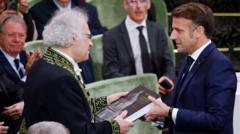NEW YORK (AP) — Merriam-Webster has announced a complete reimagining of one of its most popular dictionaries, the 'Collegiate Dictionary', set for release on November 18, 22 years after its last print update. The fresh edition will introduce over 5,000 new words, including terms like 'petrichor', the smell after rain, and 'dumbphone', devices used before smartphones became prevalent. Alongside these entries, the dictionary will also feature updated definitions, enhanced entries, and more than 20,000 new usage examples.
In an age where traditional dictionaries are seeing declining sales, Merriam-Webster aims to remain relevant by adapting to modern language and usage. The company has removed sections containing sparse biographical and geographical information, shifting focus to words that reflect contemporary culture and innovation.
While sales for print dictionaries are on the decline, Merriam-Webster manages to sell around 1.5 million copies annually. The nostalgia for print dictionaries remains, as many still value the tactile experience of flipping through pages for definitions. This latest edition promises to transform the dictionary experience, making it not only a valuable research tool but also an engaging read, which aligns with Merriam-Webster’s mission to celebrate the evolution of language.
In an age where traditional dictionaries are seeing declining sales, Merriam-Webster aims to remain relevant by adapting to modern language and usage. The company has removed sections containing sparse biographical and geographical information, shifting focus to words that reflect contemporary culture and innovation.
While sales for print dictionaries are on the decline, Merriam-Webster manages to sell around 1.5 million copies annually. The nostalgia for print dictionaries remains, as many still value the tactile experience of flipping through pages for definitions. This latest edition promises to transform the dictionary experience, making it not only a valuable research tool but also an engaging read, which aligns with Merriam-Webster’s mission to celebrate the evolution of language.







